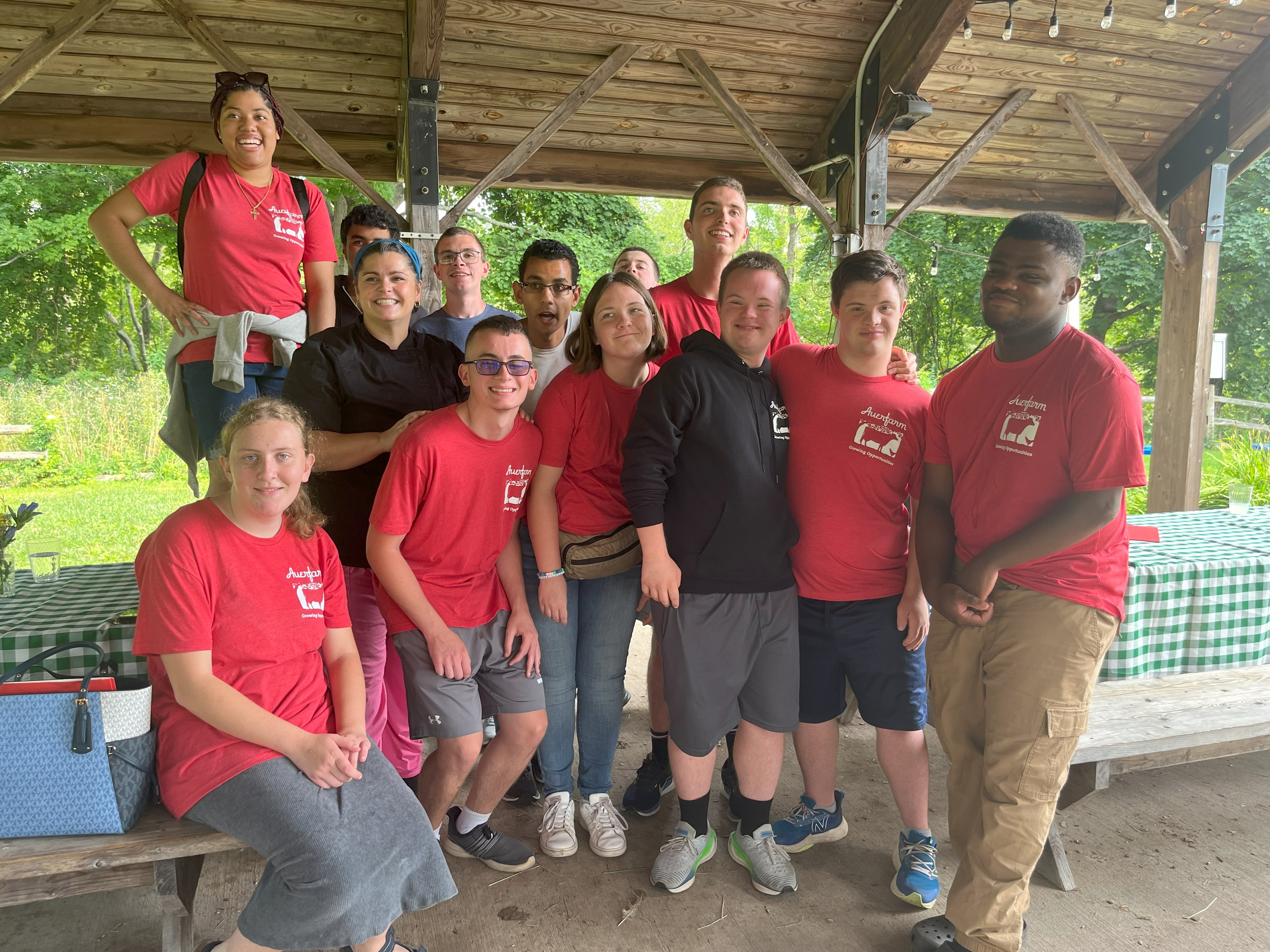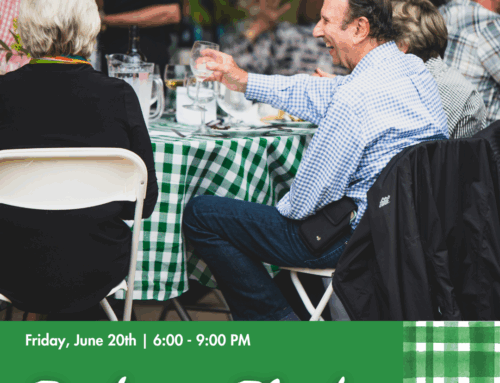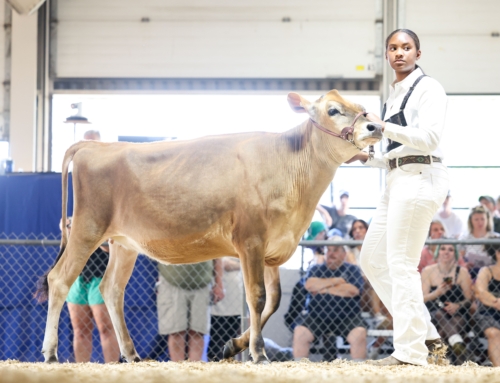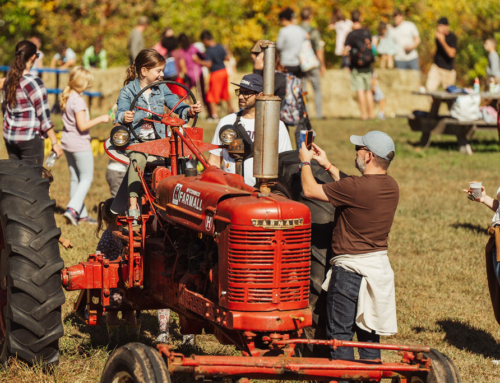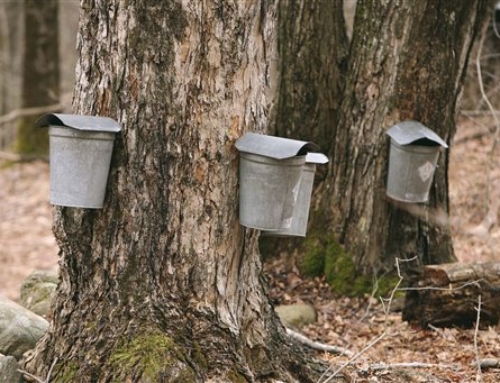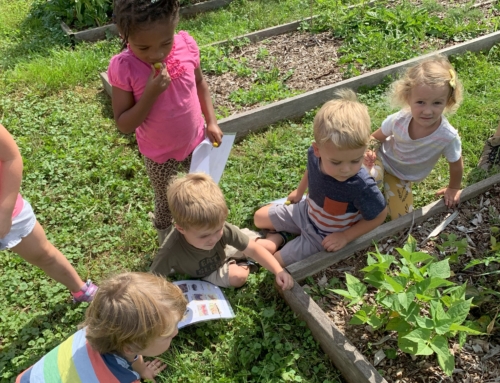Summary
How Auerfarm’s Growing Opportunities Program Nurtures Confidence and Independence Through Cooking
The August sun beat down on Auerfarm as the smell of roasting chickens floated from the cracked kitchen windows down the main archway. Inside the kitchen, the students of the Growing Opportunities program formed an ensemble of players, all sure of their roles and perfectly on cue. One student turned on the lights, another pre-heated the ovens, another prepared the meat table and yet another set up the wash station. All this was done under the subtle direction of Chef Kristiann Vargas, Resident Chef at Auerfarm and Creative Director at Distinctive Ideas. She stood back with a coffee in hand, admiring her team as they effortlessly moved around the kitchen to prepare the meal for their graduation luncheon. A smile grew on her face as she reflected on how far they had come since the program started eight weeks ago.
The summer Growing Opportunities program is a workforce development initiative at Auerfarm that employs students aged 18 to 22 from various high school transition programs. These students have a range of developmental or intellectual disabilities and are transitioning from high school to the workforce or independent living. The transition program meets the individual needs of students, which may include independence, self-care, and other daily living skills, including workforce development. This is where Auerfarm comes in. At Auerfarm, students learn skills in agriculture, facilities management, and culinary arts. The summer program includes working at Auerfarm as well as taking trips to local businesses for on-the-job training in stores that are likely to hire people with disabilities, including ReStore and Fitzgerald’s. However, perhaps the most indelible part of the program is preparing lunch every day with Chef Kristiann.
“I taught them how to cook in a way that they should know for themselves, with the idea that some of them might have opportunities to work in commercial kitchens,” said Chef Kristiann.
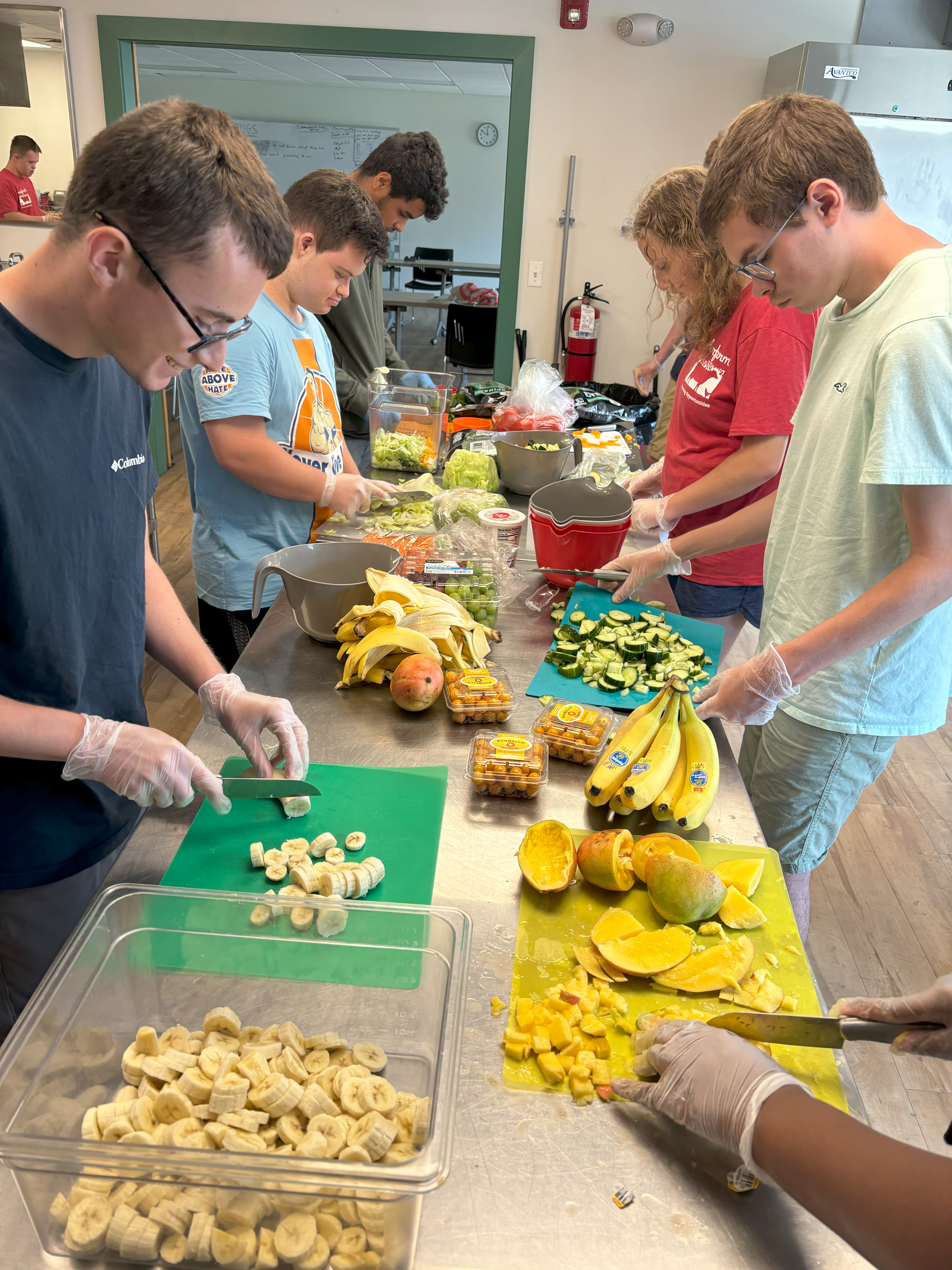
Like any recipe, the program started from scratch.
On day one, Chef Kristiann chose the menu and did all the grocery shopping. She set up each station and laid out all the necessary equipment. As the students arrived, she walked them through every step needed to prepare their meals. Each meal included a protein, a fruit, and a vegetable, along with discussions on nutrition and balanced diets. “At first, they wanted to make the same things over and over,” Kristiann recalls. “That meal was fun and delicious but maybe not the most nutritious; we can’t eat that three times a week or even three times a month—we need to switch it up.”
As the weeks went on, the students learned kitchen safety, food preparation, and sanitation. They learned to navigate a grocery store, measurements, and how to read recipes. They also became familiar with different kitchen equipment and tools—elements that are built in organically when learning how to cook. Students worked directly with farmers to harvest produce. They learned to see, smell, and taste how vegetables differed when fresh compared to when they were cooked. They discovered how dried and fresh herbs alter a dish’s flavor. Every meal included conversations about accessibility, allergies, and alternatives to ensure that each student’s needs were met. Kristiann recalls a student who had only one functioning hand trying to make pizza from dough. “I remember him looking at me and saying, ‘Well, I can’t do dough.’ I asked him why he couldn’t do dough, and he said, ‘I only have one hand.’” Kristiann puts her arm behind her back. “Okay, well I only have one hand now too; this is how we’re going to do it with one hand.” Just seeing him have that lightbulb moment was rewarding; by the end of class he asked, “Can I take a picture and send it to my mom?” “Yeah,” she replied with enthusiasm. “You can totally do that!”
The accessibility of this program ranged from physical handicaps to dietary restrictions. Students were able to try new gluten-free items and adapt regular recipes to fit their needs. They learned to navigate challenges but most importantly—they learned to embrace mistakes. “I’ve learned that if you make some tasks part of the overall process, you learn better; it makes it less daunting,” Kristiann explains. “We learn from our mistakes. If they open a pack of strawberries and see some moldy ones, they can decide: ‘Okay, these I’m not going to eat—but that doesn’t mean we have to throw away everything; this is how we handle it.’ With kids with disabilities, if it’s not exact—it’s wrong; we have to start again.” Her kitchen gives students the confidence to make mistakes, play with their food, and try new things.
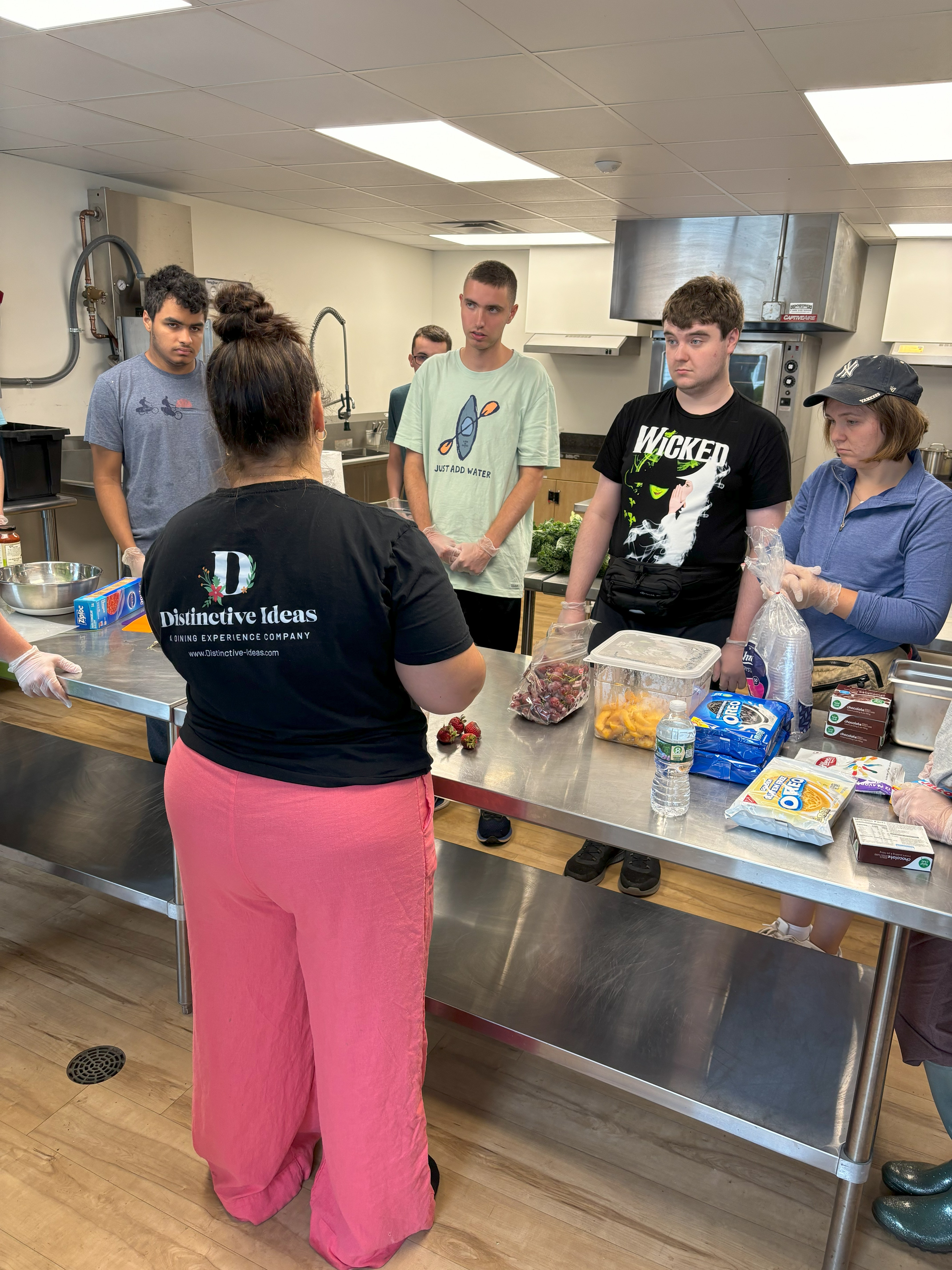
And they really would play with their food!
One day they wanted only red fruit; another day they picked “funny-looking” vegetables to taste and cook. They experimented with different flavors, textures, and combinations. During a grilled cheese cooking competition, one student added kimchi because of her love for Asian flavors while another brought in macaroni and cheese from home to add to their grilled cheese creation.
The best part was that everybody tried everything. “Everybody cooked; everybody participated; everybody did all the things,” beams Kristiann. The instructors served them every meal after they worked so hard preparing it—Owen, August, Kimbrae, and Patrick would get in line serving everyone until everyone had their plate before sitting down together—including Kristiann—to eat before cleaning up.
Throughout the summer, students became more comfortable brainstorming menus, giving opinions on recipes, grocery shopping together, and preparing their meals. By week eight, they were fully self-sufficient in the kitchen and cooked their graduation luncheon from scratch—six well-marinated and seasoned chickens along with sides and dessert. Over those eight weeks, these students transformed from being shy and unsure into taking pride in their creations.
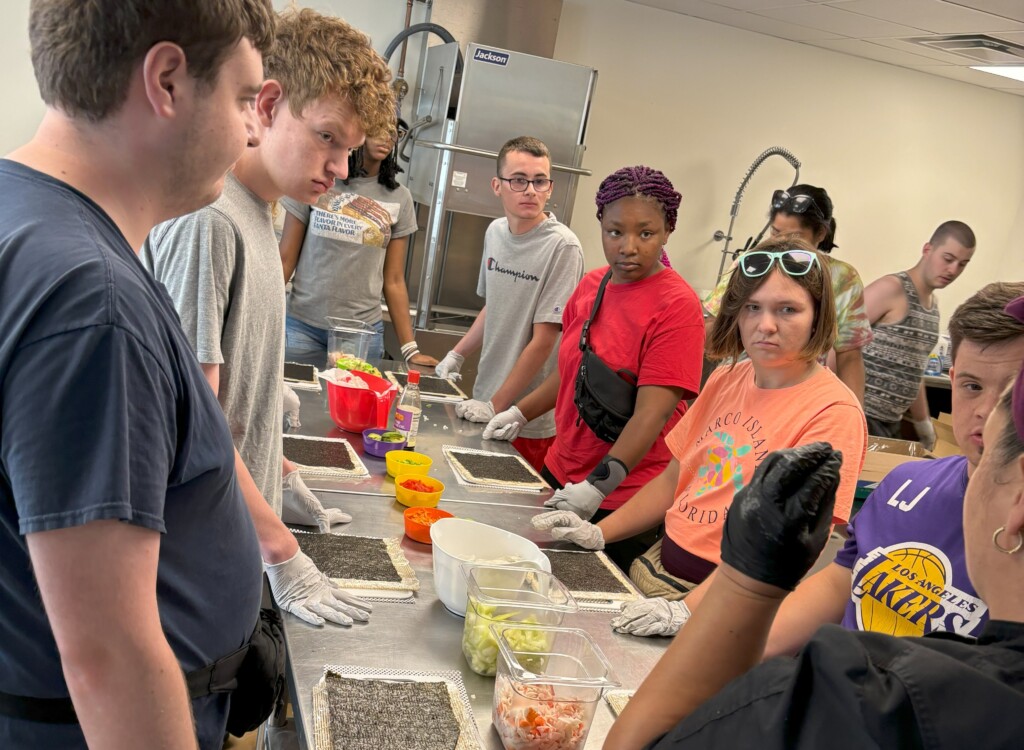
Parents shared stories about how their children sent them photos after every meal over the summer—proudly taking ownership of their nutrition—and family members noted how their nieces or nephews gained confidence in their abilities. Kristiann had been warned there might be pushback since certain disabilities can lead to rigidity regarding food choices; however, this was not her experience. “They thrive on routine,” she explains. “You show up at the right time; you do the same thing over and over; you give them repetition—and it went well.” Kristiann leans back with a proud smile on her face recalling what she describes as a life-changing summer experience.
As the summer came to a close, the Growing Opportunities program at Auerfarm not only equipped students with essential culinary skills but also fostered a sense of community, confidence, and independence. Through hands-on experiences, meaningful conversations, and the encouragement of Chef Kristiann, each student discovered their unique strengths and capabilities. The joy of cooking together transcended the kitchen, creating lasting memories and connections that would extend beyond the program. As families celebrated their loved ones’ achievements, it became clear that this transformative journey was about more than just preparing meals; it was about nurturing self-esteem and empowering young adults to embrace their potential in all aspects of life.
This article is part of Auerfarm’s Fall Appeal Newsletter. Programs like these are at the heart of our mission and with your support we can continue inspiring children and adults to engage in, learn about, and enjoy agriculture, science, and the natural environment.

